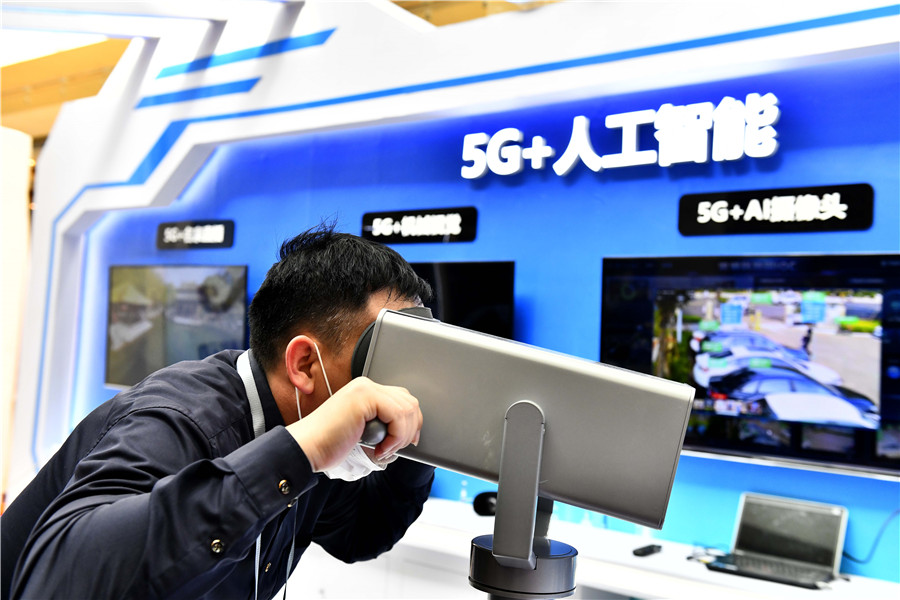Experts say China can add value to DEPA

A visitor tries smart equipment at an AI innovation and application summit in Jinan, East China's Shandong province, on April 19, 2021. [Photo/Xinhua]
Nation seeks to join 3-country digital group for innovation, development
China's latest effort to push its accession to the Digital Economy Partnership Agreement or DEPA will help transform the agreement into a bigger platform where countries can develop international rules for digital governance, thereby paving the way for open and fair conditions to bolster regional economy, business experts said on Friday.
The country has established a working team for joining the DEPA, the Ministry of Commerce said in an online statement on Friday.
Signed by New Zealand, Singapore and Chile in June 2020, the DEPA coordinates policies on the digital economy, and is the first of its kind in the world. It covers almost all key sectors of the digital economy, ranging from facilitation of commerce and trade to personal information safety.
Going forward, China will conduct in-depth accession negotiations with other members within the framework of its accession to the DEPA, and strive to join it as soon as possible, so as to reinforce cooperation with other members in the field of the digital economy and promote innovation and sustainable development, said the statement.
China officially filed an application to join the DEPA in November 2021. The application was submitted in a written letter to New Zealand, the depositary for the DEPA.
In the process of promoting its accession, China and the DEPA member countries conducted dialogues at all levels. China has held more than 10 ministerial-level talks, two chief negotiator meetings, and four technical-level informal consultations to date, according to the ministry.
As digital technologies like cloud computing, big data and artificial intelligence increasingly interact with the real economy in the process of upgrading traditional industries in many parts of the world, China's DEPA accession will not only offer its members access to a huge market but also demonstrate the country's willingness to integrate further into the Asia-Pacific economy and beyond, said Sun Fuquan, vice-president of the Chinese Academy of Science and Technology for Development in Beijing.
Moreover, joining the DEPA will help remove a number of institutional obstacles impeding China's cooperation with the three countries in the digital economy, particularly in the fields of financial technology and artificial intelligence, he said.
Even though the scale of the DEPA is relatively small at present, it highlights the need for cooperation on rule-making in trade in digital services and the digital economy, said Sang Baichuan, dean of the Institute of International Economy at the University of International Business and Economics in Beijing.
Since the COVID-19 pandemic has pushed many companies to shift their focus to digitalization across the world, China, supported by 5G technology and "new infrastructure"-related projects, has been keen to work with all sides to explore the effective path toward a cross-border digital governance framework, he said, noting such a framework would contribute to the world's growth in both trade in goods and services.
China released a plan in June to build Nansha district of Guangzhou, capital of Guangdong province, into a "major strategic platform" for global cooperation, with arrangements to step up stress tests for the nation's applications seeking to join high-level international trade and data agreements, such as the DEPA and the Comprehensive and Progressive Agreement for Trans-Pacific Partnership.
Apart from boosting foreign trade and cross-border investment activities, the digital economy and technologies can enable the growth of new energy sources and support China's "3060" carbon goals through optimal allocation and consumption of new energy, said Yin Zheng, executive vice-president of French multinational Schneider Electric SA and president of Schneider Electric China.
For many manufacturing businesses in China and abroad, the upstream and downstream of the supply chain often produce more carbon emissions than their own operations. As digital solutions can work across the entire industrial chain, such supply-chain segments should be able to cut carbon emissions throughout their life cycles using digital technologies, he said.
Photos
Related Stories
- China emerging as global AI pioneer
- AI reinvents classic song "Pearl of the East" with unimagined artistic charm
- Tianjin University develops AI sign language translation system to make more people with hearing impairment “heard”
- Beijing’s advanced industrial ecosystem emerges as AI leader in China’s thriving tech scene
- Researchers predict glaucoma incidence, progression based on deep-learning system
Copyright © 2022 People's Daily Online. All Rights Reserved.









